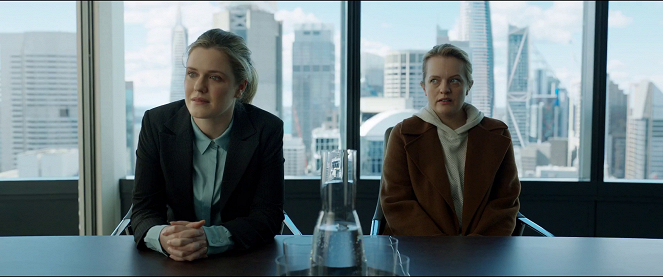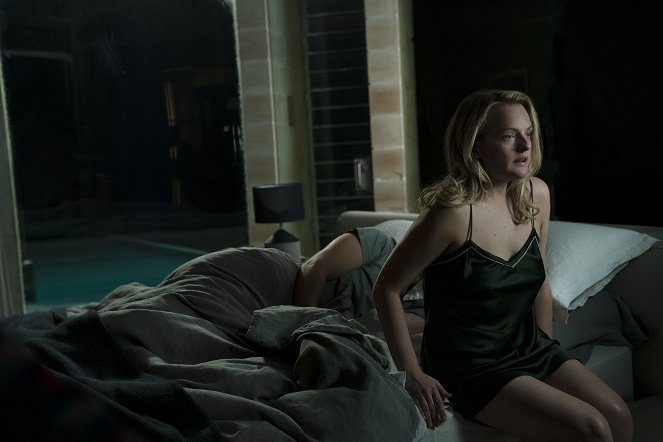Directed by:
Leigh WhannellScreenplay:
Leigh WhannellCinematography:
Stefan DuscioComposer:
Benjamin WallfischCast:
Elisabeth Moss, Oliver Jackson-Cohen, Storm Reid, Aldis Hodge, Harriet Dyer, Benedict Hardie, Anthony Brandon Wong, Amali Golden, Michael Dorman, Sam Smith (more)VOD (3)
Plots(1)
Trapped in a violent, controlling relationship with a wealthy and brilliant scientist, Cecilia Kass escapes in the dead of night and disappears into hiding, aided by her sister, their childhood friend and his teenage daughter. But when Cecilia’s abusive ex commits suicide and leaves her a generous portion of his vast fortune, Cecilia suspects his death was a hoax. As a series of eerie coincidences turns lethal, threatening the lives of those she loves, Cecilia’s sanity begins to unravel as she desperately tries to prove that she is being hunted by someone nobody can see. (Universal Pictures US)
(more)Videos (11)
Reviews (12)
I’m struggling a bit with a certain formal sterility, but I guess that kind of goes with the territory of hi-tech thrillers, and more than once I was snapped out of it by the fact that Elisabeth Moss often looks like Jeffrey Tambor wearing a wig. Still, I'm giving it full marks because I haven't seen such perfect drama in a genre film in a long time, allowing the film to graduate from intimate drama/horror to near-sci-fi actioner (a one-shot in which an invisible man beats up about ten people FTW) without retreating from the overarching theme of the seemingly irrational trauma of a victim of psychological abuse. Nor should Whannell's individual visual ideas be overlooked, such as the shot during the opening titles of a wave crashing from the ocean's perspective just before the waves break on the rocks. Or those sadistic camera glances into the void, depicting the protagonist's sense of the antagonist's omnipresence. It's really very clever. As an added bonus, I'd like to announce that I really wish more of the lead heroine roles were cast with these atypical, interesting, and adult types of actresses like Moss. Her character development works here in large part because she can believably play all the different roles she has here, and when she flips into the role of the hunter, that’s a satisfaction I sorely crave. Let the kids who bounce to movies from PornHub maybe shit themselves.
()
This post-MeToo reinterpretation of H.G. Wells's The Invisible Man transforms the subtext of numerous slasher films and paranoid thrillers (toxic masculinity is evil) into the main theme and, unlike the original story, factors in primarily the viewpoint of the victim rather than that of the attacker. The screenplay was written by a man (director Leigh Whannell), though on the basis of consultation with specialists and victims of stalkers and emotional manipulators. In order to take the feminine perspective into consideration as sensitively as possible, Elisabeth Moss was invited to refine the script. The most terrifying part of the film is its first half, which gives us a hint of the hell experienced by the partner of a person with personality disorder even after the (seeming) end of the relationship and patiently reveals the aggressor’s methods. From the ways that Cecilia’s ex-partner psychologically torments her, destroys her career prospects and isolates her from her family and friends in order to intensify her helplessness, the film is chilling in that it shows how easily such methods can be applied in a world where invisibility has yet to be invented. (Due to his ability to assign blame to the victim, the perpetrator of this form of violence often seems to be absent and invisible, someone who does not actually exist). Compared to other, similar films that keep us in a state of uncertainty until the end as to whether the main character is in fact losing touch with reality (in other words, we have the same doubt that a manipulator tries to induce in the victim through gaslighting), here we know from the beginning that Cecilia is in the right and her cognitive abilities are unimpaired, which together with Moss’s performance and the boldly subjective narration strengthens our affinity for her and the frustration arising from the fact that no one believes her, while someone else takes control of her life step by step with a chillingly premeditated plan. Though the second half of the film is closer in nature to a standard splatter film and the psychological persuasiveness more conspicuously gives way to genre conventions, it is still first and foremost about what the protagonist experiences. Thanks to the viewer’s interest in the main character, the film’s climax works superbly. It is satisfying to see who takes the lead in it and how, as well as in how simply and effectively it is directed (which is true of the whole film; instead of visual effects and scares, extremely inventive use is made of the most basic stylistic elements employed by horror filmmakers: silence and empty spaces, slow panoramic shots, well-timed point-of-view shots). It is a horror film that, in revealing some of the sources of today’s social anxieties, is equally as important as Get Out was a few years ago (as we live in a society that is more trusting of those who are good at pretending than it is of the victims of such pretending). 80%
()
The first half was on track for a five-star review. Whannell fires off one idea after another; the last time I enjoyed contemporary horror with a similarly fresh and innovative take was Wan’s first instalment of the Conjuring franchise. Wan and Whannell have quite a few things in common – both are undoubtedly clever creators who made do with modest means in their early days, relying on talent and inventiveness without any big budget to speak of. The excellent Upgrade simply wasn’t a lucky accident. It is clear to me now – and I would in fact bet my Blu-ray collection on it – that one big studio or another will make a move also on Whannell, who may look forward to a promising directing career (Scott Derrickson, another great talent, came from similar beginnings). Sadly, the second half of The Invisible Man somewhat turns into a B-movie spectacle, and I didn’t have as much fun. But the slightly cynical ending with a nice zinger was pleasant enough. Unlike Elizabeth Moss. She has no charisma, lacks feminine fragility…and what’s worse, she can’t act :o).
()
The much poked-at feminist subtext is effective, of course, but I enjoyed more the smartly transtextual format that hides the invisible male threat. Another great thing is the notional absence of a prologue and the immediate connection to the perspective of a troubled woman who desperately wants to get free from the shackles of her husband – I think the opening sequence is the best part of the whole film. The enemy is profiled gradually, mainly through the dialogues of other characters, the presentation of his lavish mansion and the maturely articulated MeToo campaign, while we are forced to keep our fingers crossed for the heroine from the get go; and in the second half Whannel can stop generating tension mainly through individual scenes (with more references to well-known horror movies than it may appear at first glance and with the lack of a visible enemy) and move on to motifs of surprise and to pique the curiosity through the story as a whole (how did he set it all up and get others to believe Cecilia?). Thanks to the transtextual genre distinctiveness, the film is much more sophisticated than just “abused woman escaping her rich husband” and lets the viewer pose interpretive challenges, but, on the other hand, most questions are answered too soon, or can be easily figured out, and the ending is like mandatory satisfaction rather than a bold resolution to the various genre and motivational concepts. But I have to admit that everything holds very well together and, with the exception of a couple of scenes with questionable effect after a second viewing, this is a superbly directed intersection between classic horror from Universal and a modern genre play with the viewer, the kind of which we don’t see very often. The scene with the paint in the attic and its climax in particular scared me almost as much as the sequence in the ventilation duct of the first Alien. 80%
()
Leigh Whannell confirms in The Invisible Man that he is a director to be reckoned with as someone who knows the horror genre. But he's still a little short of the best. His new film should have been some twenty minutes shorter, but otherwise it's a not very original but excellently made thriller. Whannell spices up the tension, helped not a little by the excellent Elisabeth Moss, and in the more action-driven scenes he confirms the qualities already hinted at in Upgrade. He also plays fair with the viewer from the start and lays all his cards on the table surprisingly early, but that doesn't stop the rather uncomfortable atmosphere from working. Personally, The Invisible Man sat better with me in the moments where it took itself 100% seriously, because its reliance on atmosphere and a more mature approach to the material really makes it work in a way that most contemporary horror films dream of. But while the whole B-movie feel is perhaps a little too rushed and it reeks a bit of trying to spice things up at all costs, overall this is well above average stuff that shows horror fans that there are still talented directors out there who can tell even a hackneyed story in a way that doesn't bore you for two hours. Although, unfortunately, it probably won't be enough for a new genre classic.
()



Ads